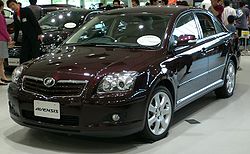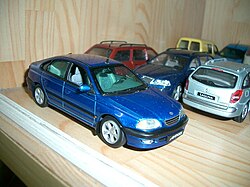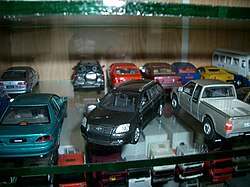| Toyota Avensis | |
|---|---|
 | |
| Manufacturer | Toyota |
| Production | 1998-present |
| Predecessor | Toyota Carina E |
| Successor | None |
| Class | Large family car |
| Body style(s) | 4-door saloon 5-door estate 5-door liftback |
| Engine(s) | Petrol: 1.6 L I4 1.8 L I4 2.0 L I4 2.4 L I4 Diesel: 2.0 L turbodiesel I4 2.2 L turbodiesel I4 |
The Toyota Avensis is a large family car built in Derbyshire, United Kingdom by Japanese automaker Toyota since the 1998 model year. It is the successor of the Carina E and is available as a four-door saloon, five-door liftback and estate. A large MPV called the Toyota Avensis Verso (Toyota Ipsum in Japan and previously the Toyota Picnic in other markets) is built in derby in the uk on a separate platform. The Avensis is the basis for the youth-oriented, North American-market Scion tC.
Name
Suggests near-Latin avena, oats, becoming the word for any stalk, then a shepherd's pan flute made of reeds. It has the -ensis ending which is commonly used to make a noun into an adjective. Brings to mind a simple sunny world of shepherds abiding in the fields.
First generation (1997-2003)
| First generation | |
|---|---|
 | |
| Production | 1998-2003 |
| Wheelbase | 2630 mm (103.5 in) |
| Length | Estate: 4600 mm (181.1 in) Others: 4520 mm (178 in) |
| Width | 1710 mm (67.3 in) |
| Height | Estate: 1500 mm (59.1 in) Others: 1425 mm (56.1 in) |
| Related | Toyota Caldina |
Toyota introduced the Avensis nameplate on its all-new car which was launched at the end of 1997. Like its predecessor, the Avensis was built at the Burnaston factory in Derby. At the same time, production of the five-door Toyota Corolla also started at this British plant.
The original Avensis had the option of four engines (1.6, 1.8 and 2.0-litre petrol and a 2.0-litre turbodiesel) and three body styles (saloon, hatchback and estate). The station wagon was essentially the Japanese-market second generation Toyota Caldina. All of the range gave solid build quality, excellent reliability, a spacious comfortable interior, generous equipment, smooth ride quality and good refinement, but very little in the way of excitement. A facelift in the summer of 2000 (which saw the engines fitted with variable valve timing) made little difference to this, although a sporty Avensis 2.0 L SR with bodykit and tuned suspension did become available.
The Avensis Verso large MPV was introduced in 2001, with room for seven occupants and 2.0-litre engines only. The Verso's platform previewed the Avensis second generation. The Avensis Verso won Australia's Best People Mover, where it is simply called Avensis, the other variants unavailable to that market.
Second generation (2003-present)
| Second generation | |
|---|---|
 | |
| Production | 2003-present |
| Wheelbase | 2700 mm (106.3 in) |
| Length | Estate: 4715 mm (185.6 in) Others: 4645 mm (182.9 in) |
| Width | 1760 mm (69.3 in) |
| Height | Estate: 1525 mm (60 in) Others: 1480 mm (58.3 in) |
| Related | Scion tC |
The second generation Toyota Avensis was launched in early 2003 an all-new format; this time it offered more in the way of driver involvement and visual appeal. The 1.6, 1.8 and 2.0-litre petrol and 2.0-litre turbodiesel engines were carried over from the previous Avensis, and the 2.4-litre four-cylinder from the Camry was also added to the range. This was the first Avensis that is exported to Japan. Due to the Camry wagon ending production, the Avensis Wagon is exported to New Zealand, in both 1.8 and 2.0-litre forms. In Britain, there were no 1.6 versions available.
In the 2004 European Car of the Year contest, the Avensis was just edged out of the top three by the Fiat Panda, Volkswagen Golf and Mazda3.
Following the withdrawal of the Toyota Camry in 2004 (2005 in Switzerland), the Avensis became the largest Toyota saloon sold in Europe.
Trim levels in the UK are the T2, T3-S, T3-X, T4, T Spirit and the T180. There is also a special edition, based on the T2 called the Colour Collection. In Ireland there are four trim levels - Aura, Strata, Luna, and Sol.
The original 115 PS (85 kW) D-4D Diesel engine has been complemented with a 2.2 L D-4D in 150 PS (110 kW) and 177 PS (130 kW) versions. Newer versions have dropped the "D-4D" and "2.0" badging from the front wings and tailgate respectively.
In Japan, the Avensis is sold as 2.0 Xi, 2.0 Li, and 2.4 Qi. Only the base model 2.0 Xi is offered with 4-wheel drive.
The Avensis Verso continued to be available alongside the new Avensis until 2006. A replacement to take over from the Avensis Verso and Previa has yet to be unveiled, but is rumoured to feature Toyota's 2.2-litre D-4D engine.
The new facelifted Toyota Avensis became available in June 2006. Some changes from the old model are the inclusion of turn signals in the side mirrors, an MP3/WMA/ASL-ready audio system, new front bumper, and a new grille. Interior materials and cloth seats have also been changed for 2006. Its multi display with on-board computer will be integrated in optitron display and is navigation ready. Also added are automatic headlights and a height-adjustable front passenger seat.
The most notable mechanical difference is the addition of a 124 bhp (92 kW) D-4D engine. This, coupled to a six-speed manual gearbox has lowered fuel consumption, emissions, and gives a quoted 0-60 mph time of 10.5 seconds.







![Validate my RSS feed [Valid RSS]](valid-rss-rogers.png)















































































ไม่มีความคิดเห็น:
แสดงความคิดเห็น